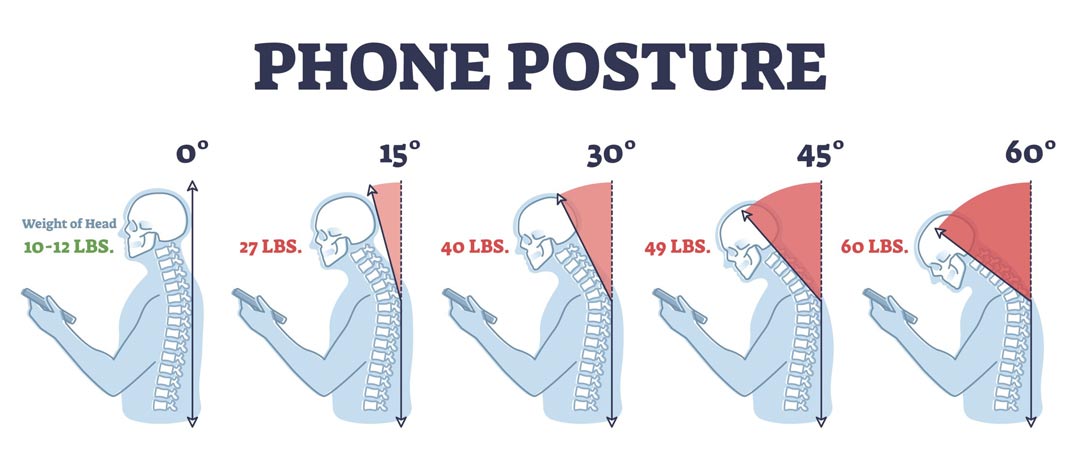
24 May How Chiropractic Care is Combatting the Tech Neck Epidemic
According to data from the UN’s International Telecommunication Union and the World Bank, within the last decade, the number of active cell phone subscriptions on the planet grew larger than the population of actual people living here. Compared to the estimated 8 billion people currently comprising the populace, and with many people having more than one subscription, in 2021 there were nearly 15 billion mobile devices being used worldwide and that number is projected to reach in excess of 18 billion by the year 2025.
Though the utilization of cellular data is now considered a common necessity in the modern world, it is also creating epidemic-level health concerns that are becoming more and more commonplace.
What is Tech Neck?
Tech neck, also commonly called ‘text neck syndrome,’ is not just caused by texting. It is a condition that exemplifies the price our bodies are paying due to the upsurge of technology use as a whole and is swiftly being considered a 21st century health issue. The unnatural positioning of the body while using phones, tablets, computers and other devices is creating undue stress on the involved joints and soft tissues of the body such as joint capsules, muscles, ligaments, tendons and nerves.
The syndrome comprises a complex cluster of clinical symptoms that can result in strain on the cervical spine (neck), cervical degeneration, deformity and other developmental, medical, psychological and social complications. Basic symptoms may include but not be limited to: headaches, pain, stiffness, neck spasms, back pain, numbness, tingling or even weakness in one or both arms. Tech neck may also cause sharp, sudden pain in the neck when users look down at their phone or other devices.
Understanding the Physiology
Ideal spinal anatomy consists of spinal curves that create an ‘S’ shape from head to tailbone. These arcs include lordotic (forward) curves in the neck and low back, and a slight kyphotic (backward curve) in the thoracic region. At proper angles, these curves serve to allow movement, support the head on a strong secure ‘pillar’ and stabilize the spine.
Tech neck correlates with a very specific abnormal posture that is hallmarked by anterior weight-bearing of the head. Anterior weight-bearing means that the head is unnaturally hanging forward, away from the body and away from the supportive column of the spine. This can create immense pressure on the joints and soft tissues of the spine and lead to straightening or even reverse the normal curve of the neck which predisposes people to joint damage in the neck and spine, a dowager hump, other health complications and future deformities.
The head is like a 10-12 pound bowling ball that sits atop the strong pillar of the spine. As shown in the image, “The Weight of Strain,” in an ideal posture, the head is positioned over the pillar of the spine and is held even with the shoulders. This natural position would only exert pressure that would simply equal the weight of one’s head. As the head incrementally comes forward (away from the support pillar) from looking at devices, the pounds of pressure created increases detrimentally and correlates with the angle of the neck and head. The joints of the spine and soft tissues of the head, neck and back can be subjected to an additional 27-60+ pounds of pressure with technology use. When you think about this happening for many hours each day, every day, it ultimately alters posture and leads to degeneration, deformity and symptoms (not necessarily in that order).

In general, people are overusing devices every single day to text, stream, surf the web, answer emails, etc. and it is altering normal posture. After consistently looking downward with the head hanging forward throughout the bulk of the day (while using devices) the problems compound.
Children and youth, starting with the use of devices so young, are especially at risk for problems earlier in life, even before being fully grown. Having forethought about what postures can affect future health is pertinent for technology users of every age. Young people in particular could be setting themselves up for a variety of imminent health issues and even a shortened life expectancy.
Tech Neck in Children and Youth
For those of us that adopted technology use later in life, and in moderation, it may not seem like such an issue. However, for children and adolescents, the use of tech is ingrained in daily life and most spend a median of 5-7 hours a day on their smartphones and handheld devices. This comes with an extensive positioning of their heads and necks flexed forward to text and watch their screens.
The excess stress from these abnormal postures is alarming and can involve the musculoskeletal system, eyes, heart, lungs, head and mental health. In the past, children would go outside to play and interact with other people. Kids of the 21st century are more sedentary and spend more time alone in their rooms staring at their phones. They may have more ‘friends’ on social media, but they are lacking face to face meaningful relationships and the physical activity required for optimal childhood growth and development.
In a recent study of 207 children and adolescents with nonspecific neck pain, 180 were diagnosed with musculoskeletal findings and muscle spasm. Of the 180, 100% reported flawed flexion of their back and neck while studying and/or using devices. Also, 21% had eye symptoms and 82% of the parents of participants reported a change in the social and psychological behavior of their children.
Chiropractic Care on the Front Line
Doctors of chiropractic (DCs) have a long-standing history of whole body health and prevention. As musculoskeletal experts, DCs can examine and evaluate children’s spines and postures, adjust affected joints and recommend changes and exercises for spinal alignment.
DCs can also advise on ergonomic positioning when using devices and help guide parents through the process of creating limited screen time for their kids to promote physical and social activity to benefit healthy well-rounded development.
Foundation for Chiropractic Progress (F4CP) | May 17, 2023
Read more: https://www.linkedin.com/pulse/how-chiropractic-care-combatting-tech-neck-epidemic-f4cp
#chiropracticprogress
#Chiropracticcare
#ThinkChiropractic

